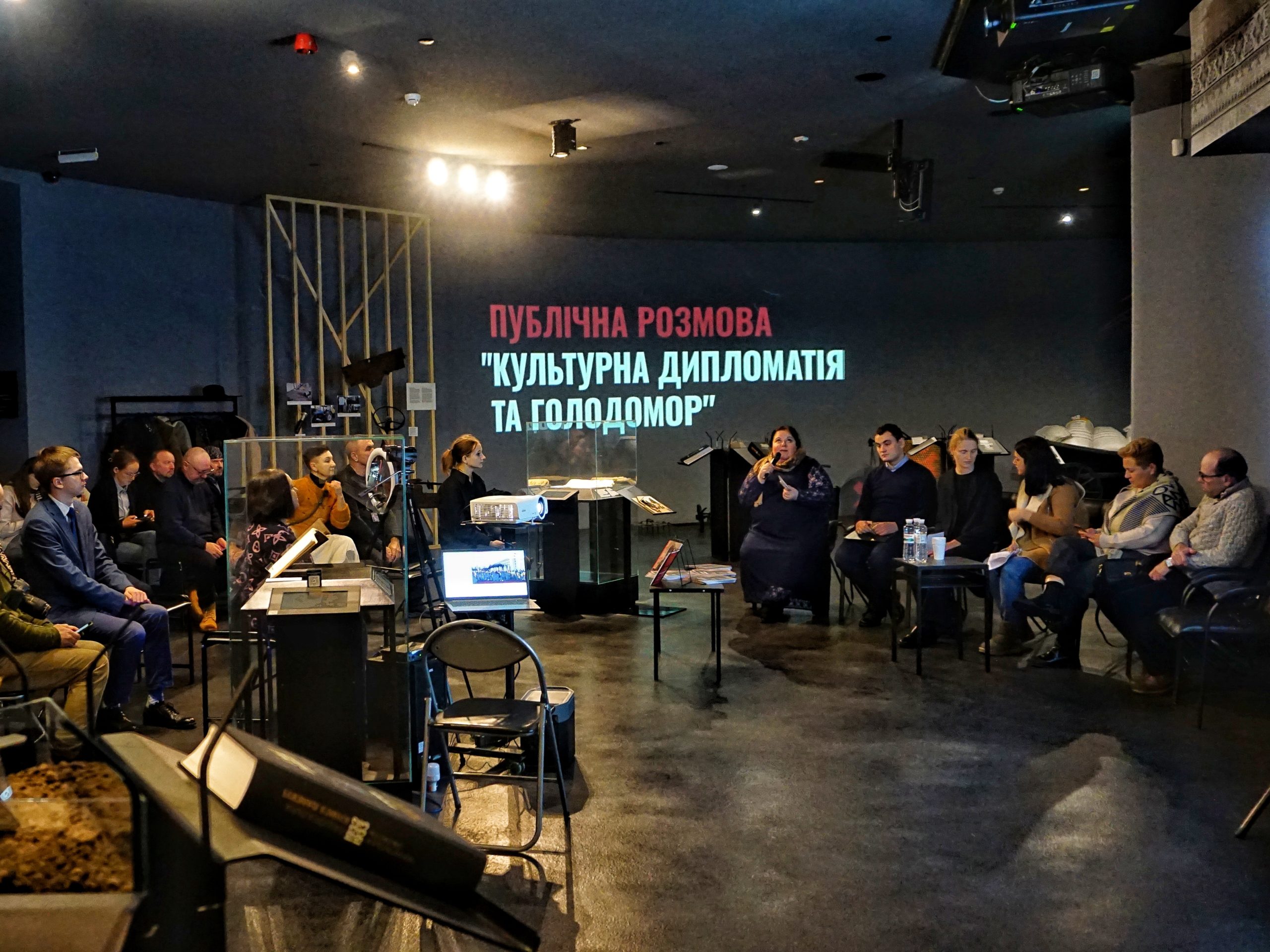A public discussion “Cultural Diplomacy and the Holodomor” was held
On December 10, the Holodomor Museum hosted a public discussion titled “Cultural Diplomacy and the Holodomor.” The event coincided with International Human Rights Day and the 76th anniversary of the UN General Assembly’s adoption of the Convention on the Prevention and Punishment of the Crime of Genocide. The public discussion included the presentation of the museum’s new publication titled “Holodomor: Main Facts.”
“The publication has already been published in English, German, and French, in addition to Ukrainian. The process of translations into other languages has also launched. Following year, we plan to receive about ten more translations of this publication,” said the head of the museum, Lesia Hasydzhak. “We are talking primarily about languages that are official in countries that have not yet recognised the Holodomor as genocide, in particular, Spanish, Turkish, Serbian, and others.”
Doctor of Philosophy Mykhailo Kostiv, the head of the Genocide, Crimes Against Humanity, and War Crimes Research Department, provided a brief overview of history. He discussed the active efforts made by the Ukrainian diaspora over the past decades to raise awareness of the Holodomor as a crime committed by the Soviet state against Ukrainians. As one of the co-authors of the publication “Holodomor: Main Facts,” he presented it to those present. “There is often a problem of the lack of reliable verified information about the Holodomor in a form accessible to the reader abroad, and this publication is designed to solve it,” he noted. “At the same time, this book contains answers to the challenges posed to us by Russian propaganda, which is still widespread in some countries.” That is, the publication debunks some common myths created in Russia to obscure the truth about the crime of the Holodomor.
Vadym Blazhei, Advisor to the Humanitarian Initiatives Department of the Worldwide Ukrainian Community and Humanitarian Initiatives of the Department of Public Diplomacy and Communications of the Ministry of Foreign Affairs of Ukraine, spoke about the complex but crucial work being carried out by the Ministry of Foreign Affairs of Ukraine in the recognition of the Holodomor as an act of genocide at the international level.
“We work with all countries, regardless of their size, location, and population. Each country’s voice on the international stage is unique, equal, and a partner. Therefore, they are all equally important to us. Of course, depending on various circumstances, in particular, the internal political situation in countries, which changes rapidly in our fast-paced world, situations may arise when it is better to work with a certain country right now and make more efforts to achieve results.”
Creative Director of the Ukrainian Institute, Tetiana Filevska, shared her thoughts on how the truth about the Holodomor is changing the world and why it is a crucial topic for understanding the relationship between Ukraine and Russia, especially in Africa and Latin America.
“In regions with fewer historical ties and less experience in intercultural interaction, the topic of the Holodomor is even more crucial. In many regions, discussions about Ukraine often centre around food security. It’s significant to note that Ukraine can feed a substantial part of the world. However, the country has also experienced an artificially induced famine that led to the deaths of millions. This fact can have a profound effect on people’s understanding of the situation. Additionally, countries in South America and Africa often perceive Russia as a supporter of freedom and emancipation. Yet, when confronted with the argument that the Holodomor was an act of genocide, their picture of the world changes.”
Lisa Heike, Head of the Cultural Department of the German Embassy in Ukraine, emphasised the lessons of the past and the importance of learning them:
“The incredible resilience of Ukrainians has become famous around the world. To my mind, an important aspect of this resilience is the country’s inner strength to confront and process the darkest chapters of its history. It has helped Ukraine toto find renewed courage and purpose through its experiences. It is deeply saddening that today Ukrainians are once again forced to fight for their very existence. Germany has faced its dark chapters in history. We have learned invaluable lessons from our past, and are now striving with all our resources to contribute to projects that preserve memory, culture, and protect cultural heritage. One such initiative is the international project “One Life, One Stone: 80 stumbling stones for Kyiv”, through which several stumbling stones can already be found on the streets of the Ukrainian capital city, commemorating the Kyiv victims of the Nazi regime during the WW2. A new phase of this project is planned in the nearest future. “
Dear friends, now you can purchase the publication “Holodomor: Main Facts” at our museum’s cash desk. To purchase online, please visit our website and click the “Support the Museum” button.
